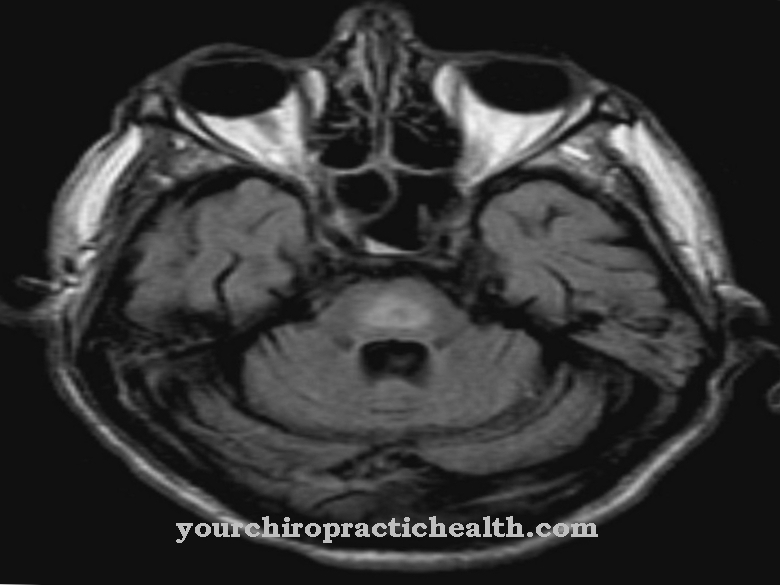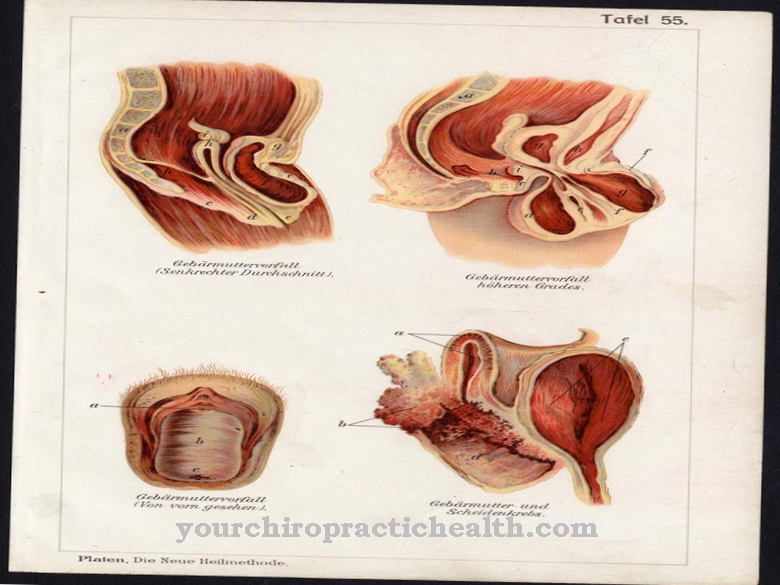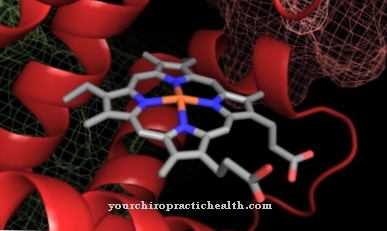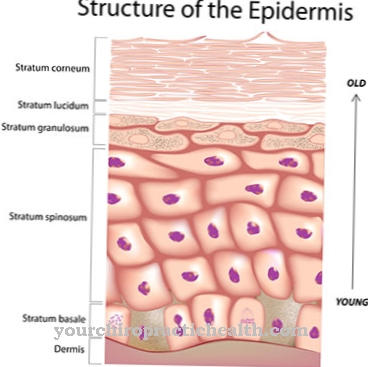The term Inflammation of the kidneys respectively Glomerulonephritis includes several diseases of the kidney. In all forms of kidney inflammation, disorders and inflammations of the kidney tissue or renal cortex occur. The most common cause of kidney inflammation is autoimmune reactions of the body's immune system.
What is kidney infection?

© Romario Ien - stock.adobe.com
Under the term Inflammation of the kidneys a number of different diseases are generally grouped together. They all have one thing in common: in the sense of an autoimmune reaction, part of the kidney tissue becomes inflamed - the kidney cortex.
Kidney inflammation is not a disease in its own right, but a collective term for symptoms in various diseases in which the kidneys are involved.
Kidney infections include the following diseases:
- acute glomerulonephritis
- rapidly progressing (progressive) glomerulonephritis (RPGN)
- Nephritic Syndrome
- chronic glomerulonephritis
- asymptomatic proteinuria
Kidney inflammation is initially a "silent" disease because it usually does not cause pain. But since both kidneys are affected and they can no longer perceive their filtering function of the blood (kidney failure threatens), the kidney inflammation can be a serious illness.
causes
The real cause of the Inflammation of the kidneys is a stress reaction (autoimmune reaction) of the body to an existing disease. In this case, the immune system attacks the body's own structures in the sense of defense - in this case parts of the kidney.
The diseases mentioned above, which all fall under the term kidney inflammation (glomerulonephritis), have one thing in common: With kidney inflammation, there is inflammation of the kidney cortex - i.e. the outer layer of the kidney. The filter cells in the kidney corpuscles (glomeruli) are particularly affected, as a result of which they can no longer perceive their blood filter function sufficiently well.
Can be distinguished from inflammation of the kidney caused by bacteria, e.g. in the course of untreated inflammation of the renal pelvis (pyelonephritis), glomerulonephritis is because the inflammation is not purulent and occurs on both sides. That is, both kidneys are affected. Kidney inflammation is also usually painless - it is therefore often not discovered for a long time or only discovered by chance. But the kidneys are vital organs. A quick diagnosis and treatment of kidney inflammation is therefore very important!
Symptoms, ailments & signs
Acute kidney inflammation initially manifests itself in a seemingly sudden feeling of illness. This is accompanied by symptoms such as loss of appetite, fatigue or fever. It can also lead to chills, an increased heart rate and other cardiovascular complaints. Typical are dull, usually throbbing pain in the lateral upper abdomen.
Often there are also signs of a bladder infection, i.e. pain when urinating, a frequent need to urinate and abdominal pain. Occasionally these symptoms appear insidious and are accompanied by other complaints. This can lead to headaches, weight loss, and abdominal pain. Signs of intestinal obstruction indicate advanced kidney inflammation.
The chronic form of kidney inflammation often develops over months or years. Those affected notice increasing fatigue, often accompanied by back pain, irritation of the gastrointestinal tract, as well as nausea and vomiting. In the long term, there is weight loss and deficiency symptoms.
As a result of the disturbed blood formation, anemia can develop, which is also expressed in deficiency symptoms such as fatigue, poor performance and pale skin. Chronic pyelonephritis is also indicated by reddish to cloudy urine and pain when urinating. In the advanced stages, little urine is excreted, which leads to high blood pressure. If the kidney infection is treated comprehensively, the symptoms usually go away. If there is no treatment, long-term consequences are possible.
Complications
If acute inflammation of the kidneys (glomerulonephritis) is diagnosed early, there is a good chance of a cure. However, acute kidney inflammation can also develop into a chronic form if the symptoms are ignored. As a consequence of delayed glomerulonephritis, the nephrotic syndrome often develops as a complication. Nephrotic syndrome is characterized by the fact that the kidney corpuscles become permeable to proteins.
This permeability can increase even further over time. Due to the increased excretion of proteins with the urine, there is ultimately a protein deficiency in the blood. This in turn increasingly leads to water retention in the legs or eyelids, which is also known as edema. Even ascites can develop. Furthermore, the lipid metabolism is disturbed in the nephrotic syndrome. The blood lipid levels are increased.
In the context of nephrotic syndrome, thrombosis is also a common complication. In addition, the immune system is weakened. As a result, there are frequent infections. Finally, the nephrotic syndrome can even lead to kidney failure. To protect the kidneys from complete failure, the blood must be regularly cleaned of toxins with the help of so-called dialysis. The nephrotic syndrome is curable with intensive treatment. In many cases, however, permanent kidney damage remains. In extreme cases, a kidney transplant is necessary to save life.
When should you go to the doctor?
See a doctor as soon as abdominal pain develops that is not caused by a woman's menstrual period. If you feel unwell, have difficulty urinating, feel exhausted or have an increased body temperature, a doctor should be consulted. A decrease in resilience, abdominal pain, loss of appetite and a refusal to eat are worrying and should be clarified by a doctor.
Weight loss and headaches are signs of a health problem that should be investigated and treated. If the symptoms persist for several days or if they increase in intensity, a doctor is required. Feeling sick, loss of libido, or pain during sexual intercourse are indications that should be followed up. If there is back pain, a reduction in performance or if everyday obligations can no longer be adequately fulfilled, a visit to the doctor is advisable.
Frequent urination, which occurs again immediately after using the toilet, as well as abnormalities in the amount of urine excreted, must be discussed with a doctor. Without adequate therapy, the pathogens can spread further in the organism and lead to a further deterioration in the general condition. If you have trouble sleeping or concentrating or paying attention, it is advisable to see a doctor so that a treatment plan can be drawn up.
Treatment & Therapy
Depending on how difficult it is Inflammation of the kidneys (glomerulonephritis) the following treatment options are available: If the protein excretion and the excretion of red blood cells in the urine (as a result of the inadequate filtering function of the blood) is only minimal, initially only regular checks are required without further treatment.
Usually, however, "immunosuppressive therapy", e.g. with cortisone, necessary. This suppresses the overreacting immune system, which prevents the kidney inflammation from progressing. This is particularly important because the kidneys can fail in any severe acute or chronic course. Then permanent dialysis (blood washing) would be necessary to take over the filtering of the blood.
It is also important to lower blood pressure that is too high, as this puts additional strain on the filter function of the kidneys and causes lasting damage. As long as the kidneys are still functioning well enough, you should ensure that you drink enough fluids. In some cases of kidney inflammation, a diet low in salt and protein is also recommended. So far there is no form of therapy for kidney inflammation (glomerulonephritis) that treats the causes.
Outlook & forecast
The prognosis of kidney inflammation is fundamentally very variable, as it depends on the type, severity and, last but not least, the form (acute / chronic). Both acute and chronic kidney inflammation cause severe kidney damage if left untreated. Acute kidney inflammation often heals with timely diagnosis and appropriate treatment. If left untreated, however, it can lead to complete kidney failure in severe cases.
Early diagnosis and treatment are particularly important in "rapid progressive glomerulonephritis" - also known as RPGN. The latter is not infrequently severe and leads to kidney failure relatively quickly. In fact, four out of ten people diagnosed with RPGN must undergo blood washing (dialysis).
The right treatment is also extremely important in the case of nephritis that is no longer curable. In many cases, a progressive deterioration in kidney function can be prevented or at least slowed down until the patient is dependent on blood washing or a kidney transplant.
If, on the other hand, kidney inflammation does not cause any symptoms, no or only minimal protein and blood are excreted in the urine and kidney function and blood pressure show normal values, it is usually sufficient for the patient to be examined by the doctor at regular intervals.These tests should of course also include blood and urine tests.
prevention
One Inflammation of the kidneys can be prevented by the following measures: Infections that are caused by streptococci (e.g. scarlet fever) should be treated with antibiotics in good time and for a long enough time. This prevents post-infectious kidney inflammation.
Other diseases that can lead to a severe form of kidney inflammation (nephritic syndrome) should also be treated consistently. In particular, diabetes mellitus (diabetes) should be pointed out here. It is also beneficial to drink a lot, refrain from alcohol and smoking and generally maintain a healthy and sporty lifestyle.
Aftercare
Follow-up care for kidney inflammation consists of regular check-ups of the affected kidney. The organ will be examined using an ultrasound scan and other imaging tests to identify any complications. Blood pressure and the condition of the ureters may also be checked.
The doctor also scans the kidney region and looks at the patient for unusual symptoms or signs of any concomitant diseases. The accompanying medical history is used to determine complications and to answer any open questions that the patient may have. If no abnormalities are found and the patient has no further questions, follow-up care can be completed after a single check-up.
A final examination is usually carried out one to two weeks after recovery. If healing is very slow, further check-ups are necessary. The same applies to chronic complaints and to elderly or physically weakened patients. In the case of chronic and protracted courses, weekly routine check-ups by a specialist are recommended.
The medication is also checked during the appointments and adjusted if necessary. In addition, depending on the symptoms, the patient is referred to a physiotherapist or specialist who can initiate additional therapeutic measures. Follow-up care is carried out by a kidney specialist or a general practitioner.
You can do that yourself
If you have kidney inflammation, you should drink plenty of fluids. Up to three liters per day are recommended for those affected. The high fluid intake helps to move bacteria out of the kidney. Do not consume alcohol, black tea or beverages containing caffeine. These products have a negative effect on the organism and the functioning of the kidneys. The consumption of medicinal teas, green tea and non-carbonated water is healthier and more beneficial.
When using the toilet, make sure that the bladder is always completely emptied. This allows more bacteria to be expelled from the body. In addition, urination should take place more frequently than normal. The body needs sufficient warmth during the complaint period. The back and lower abdomen can be warmed up several times a day with a hot water bottle. It is also advisable to wear warm and breathable clothing. Regular Sitz baths with chamomile are also considered beneficial and health-promoting. It is particularly important to ensure that the kidney region is spared the effects of drafts.
Sufficient rest and rest is particularly helpful in the initial phase of the disease. Bed rest is required if the kidney disease is advanced. Physical overexertion should be avoided and regular breaks should be taken from all activities.





.jpg)





















